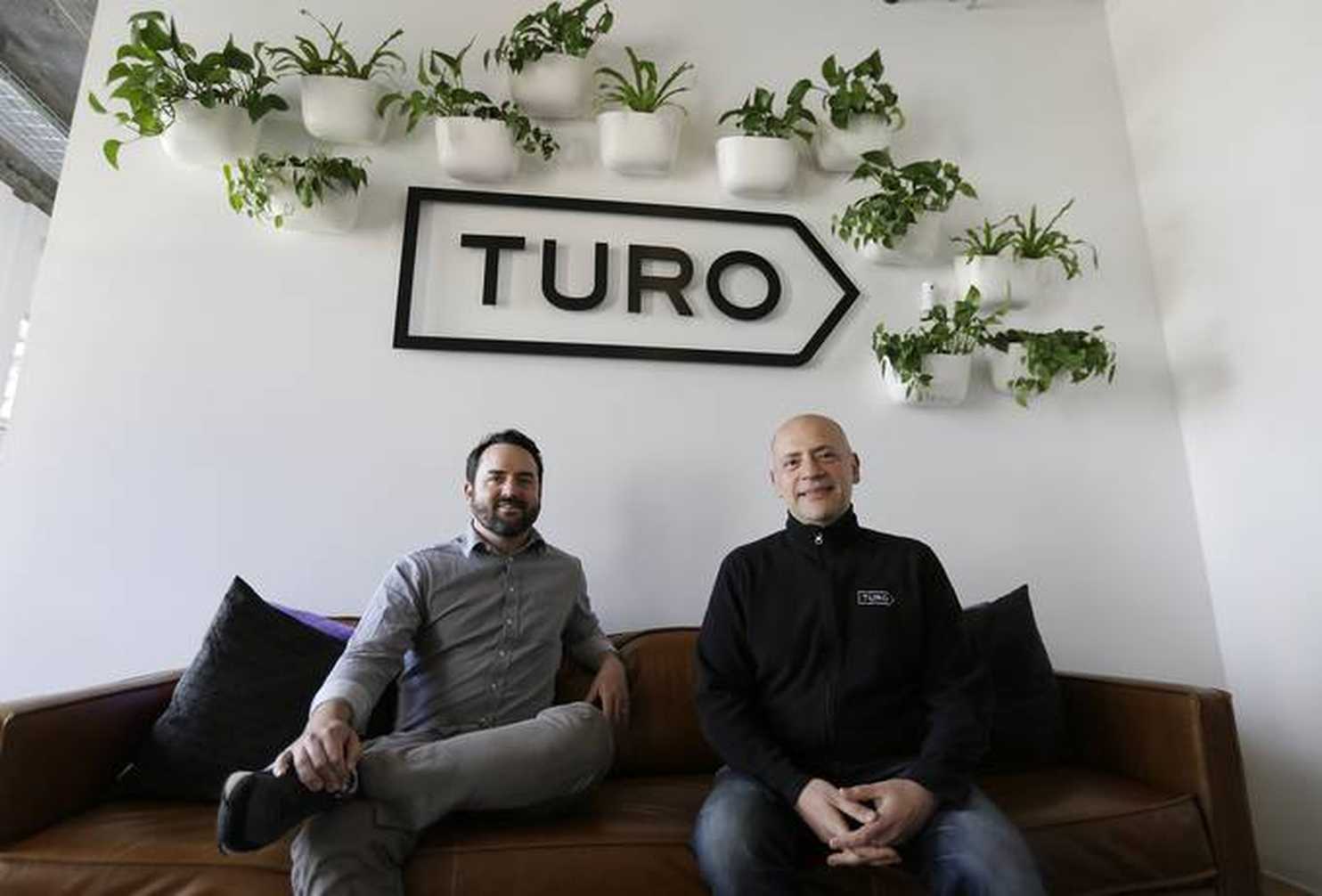with Tonya Riley
Start-up executives who immigrated from other countries are pushing back on President Trump’s executive order to pause immigration.
They argue their stories are proof that immigrants can play a critical role in creating jobs in the United States. They’re attempting to counter President Trump’s framing that the order will protect U.S. jobs during an unprecedented spike in unemployment since March. More than 4.4 million Americans sought jobless benefits last week — on top of 22 million Americans who had sought benefits in previous weeks.
Andre Haddad, who immigrated to the United States in 2002 after growing up in war-torn Lebanon, is now a U.S. citizen and the chief executive of the car rental service Turo. Haddad’s company employs around 250 people, after industry turbulence forced him to lay off workers in late March. He is calling Trump’s position “a completely flawed argument.”
“You have to have a very special view of the future and of your life to want to uproot yourself from the place that you know,” Haddad told me in an interview. “Because of the unique personality trait immigrants bring with them, they actually create a lot in the U.S. rather than take value.”
In this April 29, 2019, photo, Steve Webb, VP of Communications, left, and Andre Haddad, CEO, right, pose in the entryway of Turo in San Francisco. (AP Photo/Eric Risberg)
Luis von Ahn, the chief executive and co-founder of the language education start-up Duolingo, shared a similar experience. He’s originally from Guatemala, and his company was valued at $1.5 billion in a funding round last year. From Twitter:
I came to the US and instead of taking American jobs, I helped create jobs and billions of dollars in value. Using the virus to stop the Green Card process will hurt companies like @duolingo. We’ll have to open offices and move jobs outside the US because of this. 🙄
— Luis von Ahn (@LuisvonAhn) April 22, 2020
Their comments underscore how Trump’s latest action is inflaming a persistent division between the tech industry’s reliance on foreign talent and the administration’s “America First” agenda.
Trump’s immigration order isn’t Silicon Valley’s worst case scenario. But it still could create pain points.
The order, which takes effect today, has broad exemptions. It will not apply to immigrants who already are living and working in the United States and are seeking to become legal permanent residents, Nick Miroff, Maria Sacchetti and Arelis R. Hernández report. It also won’t impact foreigners coming on temporary visas for work — including the H-1B visas popular in the tech industry which allow 85,000 high-skilled people to come to the country for at least three years to work, according to the Wall Street Journal.
Robert D. Atkinson, the president of the think tank Information Technology and Innovation Foundation, tells me that it could impact some companies who are trying to bring workers outside the United States into the country on green cards.
“It’s not the worst thing that could happen, but it’s not a helpful thing either,” he said.
The order will put a halt on some family-based categories of visas, which the president has often derided as “chain migration.” Todd Schulte, president of the technology immigration group Fwd.us, tells me that this order could prevent many immigrants working in the tech industry from securing visas for their family members.
“The American Dream is supposed to be the ability for people to build a better life for themselves and their families,” he said. “We don’t live up to the American Dream as often as we would like to say. This would get rid of that.”
Currently the pause will only take effect for 60 days. But the Trump administration has said that it could extend it further — and the longer it’s in effect, the greater impact it could have, Atkinson told me.
The final executive order was a more narrow proposal than what some in Trump’s orbit initially supported. The president suggested on Tuesday that he’s weighing a second, more restrictive immigration order — but offered few details.
Trump’s comments could have a longer-term impact on recruiting foreign talent to the industry.

President Trump speaks about the coronavirus pandemic during a White House press briefing Wednesday. (Alex Brandon/AP)
And they are already injecting broad uncertainty for many tech workers.
Haddad says his workforce is made up of roughly 20 percent immigrants on a green card or visa, and they come from all over the world. He also has several workers who had to leave the United States because they did not get an H-1B visa through the lottery process. Visa applications are pending for them, and he doesn’t know what’s going to happen to those employees.
“No matter what the fine print or the exceptions are, the notion that the president of the United States believes immigration is a bad thing for the country is just ludicrous in my view,” Haddad said. “Who knows how long it’s going to last? Who knows how many lives it’s going to disrupt even though it’s a temporary order?”
It’s an anxiety some in the tech industry say is becoming familiar. “With President Trump, there’s always uncertainty,” Atkinson said. “You just don’t know until you see the tweet.”
He said that the president’s action could make it harder for the tech industry to recruit top talent abroad.
“It sends a message to high-skilled workers around the world you’re going to take a risk if you come to the United States,” he told me. “Maybe it’s better to go to Canada or the U.K.”
The largest tech companies so far have been largely quiet about the order.
Facebook, Apple, Google, Microsoft and Amazon did not immediately respond to requests for comment or declined to comment on the order. Twitter spokeswoman Katie Rosborough said Twitter is “working closely with our immigration counsel to assess the full details of the immigration order.”
Microsoft president Brad Smith tweeted about the value of immigrants shortly after Trump announced on Twitter that he was signing an executive order to suspend immigration.
Immigrants are vital to our company & the nation’s economy. Today, they’re helping us respond to COVID-19 in healthcare, research, IT, infrastructure, food supply, & more. As we focus on recovery for all Americans, we must not lose sight of the critical importance of immigrants.
— Brad Smith (@BradSmi) April 21, 2020
In the past, top tech executives have been much more outspoken about actions the president took to limit immigration to the United States. Top tech executives were prominent critics of the Trump administration’s ban on travel of citizens from several Muslim-majority countries. Google co-founder Sergey Brin even protested at the airport.
But Atkinson said the optics around the coronavirus could be shifting their calculations. “It’s partly because people are concerned about job loss, and for tech companies to push this right now sends wrong message,” he told me.
But that doesn’t change the stress for chief executives already grappling with the economic fallout of the virus.
As a company in the travel sector, Turo has been hit by the coronavirus, Haddad tells me. “It’s absolutely the worst moment to add more stress and anxiety on founders and CEOs,” he said. “The worst moment. It couldn’t be worse.”
Our top tabs
Scammers are swiping thousands of stimulus relief checks.

A computer screen grab shows the glitch millions of Americans encountered when trying to track the status of their coronavirus stimulus checks. (Jim Lo Scalzo/EPA-EFE/Shutterstock)
The bad actors have used people’s personal information from past data breaches to steal the checks, Nathaniel Popper at the New York Times reports. It’s a devastating blow for victims.
“I cried all day,” Krystal Phelps, whose family lost $3,400 in relief, told the Times. “It is a little relief, and then you find out it isn’t happening.” Phelps needed the money to pay for her mortgage.
Security experts say that the low-barrier site designed by the government to help Americans more easily get their checks has actually helped scammers. “The stimulus site is a little bit like ringing the dinner bell for hackers,” Brian Stack, the vice president for dark web intelligence at Experian, told the Times.
Scammers have also turned to fraudulent emails and other tricks. The FBI has received more than 3,600 cybercrime complaints related to the coronavirus, the Justice Department announced yesterday. The Federal Trade Commission reported more than double that in coronavirus-related scams earlier this month.
Experts working with fraud victims say the scale of attacks is alarming. “I’ve been in this space for over 30 years and I have not seen anything like this in my entire career,” Eva Velasquez, chief executive of the Identity Theft Resource Center, a nonprofit that helps victims, told the Times. “The scope, the scale, the speed and the efficiency of the scams is breathtaking.”
Hosts want to know where is the $250 million in relief money that Airbnb promised them.

(Gabby Jones/Bloomberg News)
Hundreds of Airbnb hosts are complaining in online groups about the relief fund, CNBC’s Salvador Rodriquez reports. Airbnb says it released the first round of payments this week.
But hosts who have received payment say the funds are less than they calculated. Airbnb promised hosts they would receive 25 percent of the cancellation fee, which can vary, that is typically paid by guests who change their travel plans.
Thierry Rignol, a host who rents out 80 properties across the United States, said he received only $106.02 for more than $30,000 in canceled reservations. “It’s a complete joke,” Rignol said. “When am I going to see the rest of that? If it’s three months from now, it’s really not going to help anyone. If it’s a promise to pay in the future, it’s worthless.”
Airbnb hosts aren’t alone: Gig economy workers at Amazon, Instacart and Uber have also reported difficulty accessing relief funds announced by companies.
Top social networks unveiled new policies to crack down on falsehoods.

A person browses the Twitter account of Alt News, a fact-checking website. (Altaf Qadri/AP)
Facebook will make it easier to see where election-related posts originated.
The social media platform will display the country of origin for some non-U.S.-based Facebook pages and Instagram accounts primarily targeting American users, the company announced in a blog yesterday. It could help quell criticism from U.S. lawmakers that the company isn’t doing enough to curb foreign influence in U.S. elections.The pilot will eventually expand to other countries.
Twitter will remove coronavirus content that could lead to offline destruction of 5G telecommunications infrastructure, TechCrunch reported yesterday.
Such online theories have already led to the destruction of cellphone towers in the United Kingdom. Such theories also gained traction on Facebook and Instagram, but those services have yet to institute a similar ban.
Coronavirus fallout
More tech companies are laying off employees amid the crisis.
- Magic Leap, an augmented-reality company, is laying off about half of its 1,000 employees as it shifts its focus from consumer to enterprise technology, Bloomberg reports.
- Patreon, a subscription platform, also laid off 13 percent of its staff, TechCrunch reported. The company reported onboarding 50,000 new members last month and a 60 percent increase in average income for creators, raising questions about what sparked the layoffs.

A pair of Magic Leap 1 Lightwear glasses.
For workers eventually heading back, things will be very different.
Snap will consider implementing temperature checks and changing the office layout before allowing employees to return, chief executive Evan Spiegel said Wednesday on CNBC’s Squawk Alley.
“We’re thinking of our micro-kitchens; what snacks can we provide? Do we have to get rid of ice dispensers? Our team has been really trying to get ahead of the curve,” Spiegel said. “Fundamentally it’s going to be a slow process for us and really based on each individual’s comfort level,” he added. “What we want to do is provide the option to return to our offices when it’s safe.”
“Snapchat is for helping people stay close with their friends and family and that’s never been more important during this difficult time.” @Snapchat CEO @evanspiegel joins us exclusively to discuss his first quarter results and the company’s role during this pandemic. @CNBC pic.twitter.com/CXAYUwoJbZ
— Squawk Alley (@SquawkAlley) April 22, 2020
More coronavirus fallout:
Hill happenings
Sen. Edward J. Markey (D-Mass.) says the White House should provide guidelines for states using contact-tracing tech.

Truman Medical Center nurse Kelly Meyer takes a sample from Troy Hughes during a walk-in coronavirus test. (Charlie Riedel/AP)
“The federal government must provide leadership, coordination, and guidance to ensure that contact tracing efforts are effective and do not infringe upon individuals’ civil liberties, including the right to privacy,” Markey urged in a letter to Vice President Pence yesterday.
Markey says the White House needs to develop guidelines outlining that private entities limit data tracking to use on covid-19 and make sure that companies are held accountable for misusing data they collect.
Apple and Google have both promised to end their contact-tracing programs after the pandemic is over. But lawmakers are skeptical.
Privacy monitor
Apple will fix a flaw that possibly left more than half a billion iPhones vulnerable to hackers.

People wearing protective masks wait in line outside an Apple Store. (SeongJoon Cho/Bloomberg News)
The vulnerability affected the email app on iPhones and iPads and might have been used by hackers as early as 2018, ZecOps, the cybersecurity firm that found the bug, told Christopher Bing and Joseph Menn at Reuters.
There’s evidence the bug was used to hack at least one Fortune 500 North American technology company and five other companies in Japan, Germany, Saudi Arabia and Israel, ZecOps said but declined to name any victims.
Apple acknowledged that it was developing a fix for the vulnerability but declined to comment further.
Rant and rave
A parody for our times.
Report: Amazon Using Heat-Sensing Alien Hunters To Track Workers Attempting To Unionize https://t.co/z4TtRs60c8 pic.twitter.com/Rv7BtVFqZI
— The Onion (@TheOnion) April 22, 2020
Trending
Bookmark this

America’s inability to act is killing people.
Vox
Daybook
- Code for America will host the second of its virtual summit events — “Delivering a Human-Centered Social Safety Net in a Time of Crisis” — on Thursday at 9 a.m. Pacific time. The webinar will focus on how governments are meeting unprecedented challenges posed by covid-19 and the importance of a human-centered approach to delivering social safety net services.
- Google will announce earnings on Tuesday.
- Facebook and Microsoft will announce earning on Wednesday
Have an event you want our readers to know about? Email [email protected].
Before you log off
Millions of people staying at home during the coronavirus pandemic use delivery drivers such as Kenny Camacho, who is between jobs and trying to make ends meet.










